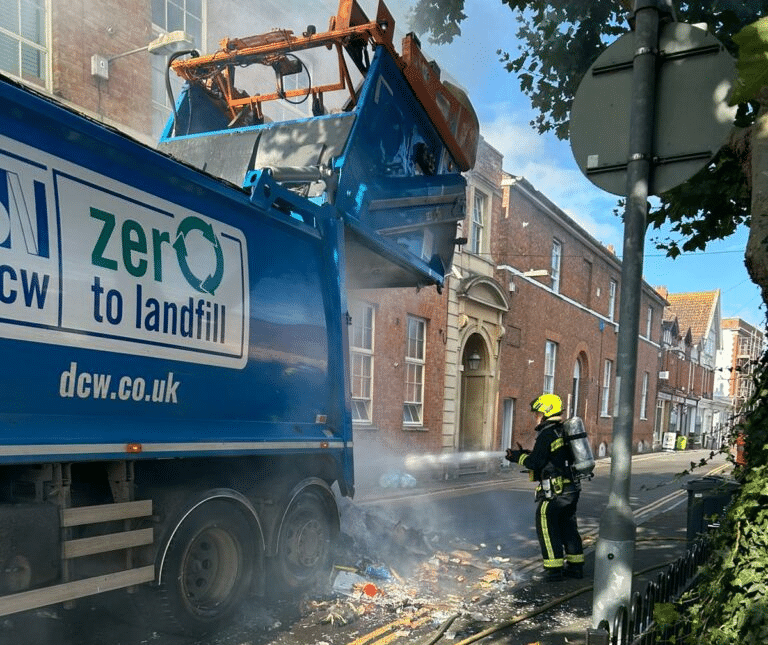DCW, the South West’s leading commercial recycling and waste management firm, has issued an important reminder to not put Waste Electrical and Electronic Equipment (WEEE) in general waste bins after a DCW dustcart caught fire in Bridgwater.
The fire on Friday 6th October 2023 was caused by a lithium-ion battery inside a mobile phone which should not have been placed in a general waste bin.
DCW’s crew acted quickly as soon as they noticed smoke coming from the back of the dustcart. Following standard protocol, the crew pulled into King Street and emptied the waste load onto the street, using a fire extinguisher from a nearby barber shop to extinguish the blaze. Emptying waste onto the street reduces the risk of the fire spreading to the lorry’s fuel tank which would cause an explosion.
Devon and Somerset Fire and Rescue Service and Avon and Somerset Police were on the scene to control the fire which did not spread. No members of the public or the DCW crew were injured during the incident.
Following the acquisition of DCW by SUEZ recycling and recovery UK in September, the SUEZ team also attended the scene to assist with the clear-up. The dustcart was taken to the Bridgwater depot to check for damage before it could continue its rounds.
Grant Scott of SUEZ, commented: “We can confirm that a fire broke out inside one of our dustcarts which was doing its rounds in Bridgwater on Friday 6th October, caused by a discarded mobile phone. Thanks to our well-trained crew, the fire was quickly identified and extinguished. Our team took the appropriate course of action and followed well-rehearsed procedures.
“Please dispose of any electrical items responsibly. WEEE such as mobile phones, disposable vapes, tablets and laptops should under no circumstances be thrown into general waste. The batteries found in these items are incredibly flammable and unfortunately, fires break out in refuse vehicles and at recycling centres all too often due to items being disposed of carelessly. Please ensure to use a specialist WEEE recycling service and separate the waste into a WEEE disposal bin as per regulations. Plenty of supermarkets offer disposal bins for batteries, making battery recycling easily accessible.”
Grant continued: “I’d like to thank the DCW and SUEZ crews for acting fast and following protocol to control the fire. It’s positive to see such a fantastic partnership in action following SUEZ’s acquisition of DCW.”
Recent research has revealed an alarming increase in bin lorry fires across the UK due to WEEE being disposed of incorrectly. Freedom of Information requests to councils across the UK by insurer Zurich Municipal discovered 125 fires in bin lorries had been recorded in 2022 compared to 77 in 2020, an increase of 62% (source: MRW).
The WEEE Regulations 2013 stipulate conditions under which, by law, waste electric and electronic equipment from UK businesses and public bodies must be disposed of. The regulations are in place to reduce the amount of WEEE ending up in landfill, recycle as much material from WEEE as possible and to safely manage the disassembly and treatment of hazardous component materials.
Since 2004, DCW has provided a fully compliant WEEE recycling collection service to support its customers to meet their own obligations under the evolving regulations. DCW’s safe and efficient WEEE service aligns with the company’s mission to help South West businesses achieve Zero to Landfill. All WEEE processed by DCW is re-processed in the UK at licensed facilities.
To find out more about DCW’s competitive commercial WEEE recycling service, call 01392 361300 or click here.
